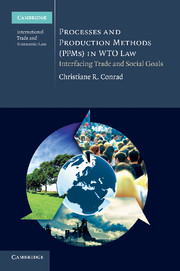Book contents
- Frontmatter
- Contents
- List of figures and tables
- Preface and acknowledgements
- Table of GATT 1947 Reports
- Table of WTO Reports
- List of abbreviations
- Introduction
- I Foundations: the relevance of NPA measures at the interface of domestic regulation, economic globalization and world trade law
- II Legal analysis: reviewing the status of NPA measures de lege lata
- 3 Preliminary considerations: applicability of WTO law and other international law to NPA measures
- 4 Consistency with GATT obligations
- 5 Limits to the justification of NPA measures under the general exceptions
- 6 The status of PPM measures under the TBT Agreement and the SPS Agreement
- III Outlook: new perspectives on the legal status of NPA measures
- Summary and concluding remarks
- Bibliography
- Index
6 - The status of PPM measures under the TBT Agreement and the SPS Agreement
Published online by Cambridge University Press: 05 June 2011
- Frontmatter
- Contents
- List of figures and tables
- Preface and acknowledgements
- Table of GATT 1947 Reports
- Table of WTO Reports
- List of abbreviations
- Introduction
- I Foundations: the relevance of NPA measures at the interface of domestic regulation, economic globalization and world trade law
- II Legal analysis: reviewing the status of NPA measures de lege lata
- 3 Preliminary considerations: applicability of WTO law and other international law to NPA measures
- 4 Consistency with GATT obligations
- 5 Limits to the justification of NPA measures under the general exceptions
- 6 The status of PPM measures under the TBT Agreement and the SPS Agreement
- III Outlook: new perspectives on the legal status of NPA measures
- Summary and concluding remarks
- Bibliography
- Index
Summary
Introduction
In contrast to the GATT, both the TBT and the SPS Agreement explicitly mention ‘processes and production methods’. This chapter therefore explores whether PPM measures have a special legal status under both agreements. Despite the explicit reference, however, it is unclear whether both agreements cover all types of PPM measures, or whether coverage is limited to incorporated PPMs. The question arises if the GATT remains of any actual relevance, since a large part of NPA measures could fall within the scope of the TBT and the SPS Agreements as lex specialis. While this issue is very complex and contentious for the TBT Agreement, section 6.3 explains that the SPS Agreement covers only incorporated PPMs and is therefore of little importance to this work. The TBT Agreement, on the other hand, relates to a specific subject matter, namely, technical barriers to trade, and therefore cannot cover all PPM, let alone NPA, measures. In addition, the relationship between the TBT Agreement and the GATT in the case of conflicting provisions is not entirely clear. The following section argues that the TBT Agreement is applicable to an important group of technical norms, namely, labelling regulation, even if these concern unincorporated PPMs. Its focus is on the consideration of consumer information as a legitimate objective highly relevant to labelling requirements concerning unincorporated PPMs.
The TBT Agreement and PPMs
Given the lack of international harmonization, technical standards and regulation have the potential to create substantial non-tariff barriers to international trade.
- Type
- Chapter
- Information
- Processes and Production Methods (PPMs) in WTO LawInterfacing Trade and Social Goals, pp. 374 - 422Publisher: Cambridge University PressPrint publication year: 2011



